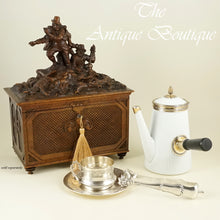Antique Belle Epoque era French sterling silver and porcelain tea pot. In the pattern Plisse by Pillivuyt, featuring fluted motif decorating the body and lid. Enhanced with exquisite French .950 sterling silver mounts with gilt vermeil finish. The hinged collar is patterned with Louis XVI style ribbon & reed. The ebonized wood side handle terminating to a sterling silver sleeve. A finely casted pineapple finial adorns the lid. In good antique condition with general wear to the silver mounts commensurate with age. No chips or cracks to the tea pot. Marked for Charles Pillivuyt & Co, Mehun-Sur-Yevre. The silver mounts are thoroughly hallmarked with the French Minerve 1st standard mark, in use from 1838, which guaranteed the finest quality silver of .950/1000 purity (95% pure silver and a higher grade than the standard .925 for sterling). Maker's marks for silversmith Auguste Leroy, who commenced trade at workshop was located at 22 rue Réaumur, Paris. This mark was in use from 1891 to 1912. Measures 7 1/4" height x 7 3/4" length (with the handle).
In 1818, Louis Charles Pillivuyt recognized the huge advantages porcelain had over its earthenware and other porous product competitors. He set about creating his own individual combination of raw materials in an attempt to make the highest quality porcelain. His porcelain factory was founded in the Berry Region of central France at Foëcy. In 1853, Charles Pillivuyt decided to move his factory to Mehun-sur-Yèvre near the channel of Berry about 200 miles outside of Paris between Bourges and Vierzon. Pillivuyt made beautiful quality porcelain, according to artisanal traditions, using techniques that have not changed since the company was founded in 1818. With locations at 46, rue de Paradis-Poissonnière in Paris and at 15 Hatton Garden, E.C. London. Pillivuyt was honored with numerous successive medals during Universal Expositions/Worlds Fair of 1823, 1853, 1863, 1878 and Grand Prix in both 1867, 1889 and 1900. The international reputation of Pillivuyt was incontestable and in 1860, a quarter of the production was already sent all over the world. He was succeeded by his son Louis in 1899.

